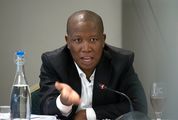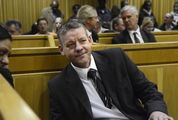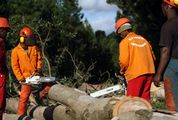BUSINESS DAY TV: Agriculture ‘not high on agenda’ in climate change discussions
by Transcript service,
2015-12-07 20:23:56.0
DR MANYEWU Mutamba is an analyst for economics and policy at the Southern African Confederation of Agricultural Unions
BUSINESS DAY TV: The optimists are hopeful of a new climate change deal from Paris but one of the easily most affected sectors by climate change appears to have been excluded as far as new proposals go, and that’s agriculture. Joining me now is Dr Manyewu Mutamba, analyst for economics and policy at the Southern African Confederation of Agricultural Unions.
Manyewu, you say farmers and farmers’ organisations are shocked by the absence of a clear and solid proposal on agriculture. I’m shocked because surely you’re one of the most affected parties?
MANYEWU MUTAMBA: Indeed, we are shocked and we are quite disappointed that agriculture finds itself being excluded from such a key agreement that is going to shape a response to climate change for many years to come. We definitely feel that agriculture needs to be at the centre of any climate change response, so for us any deal without agriculture is actually not a deal at all.
BDTV: How is it that you seem to have fallen by the wayside, that you’re not at the forefront of people’s minds who are meeting in Paris?
MM: Yes, agriculture is actually at a very difficult road with respect to the negotiations. In Durban we seem to have made some headway after a lot of pressure from African leaders and farmer leaders. We seemed to be getting on board but now this latest development is actually a regression from that progress that we thought that we’d achieved in Durban. So it looks like there’s still a lot of work that needs to be done for agriculture to get the recognition and the support that we believe it requires, because obviously, as you have said, it’s one of the most climate-sensitive sectors and we definitely need strong action to support agriculture, otherwise climate change is just going to be devastating for the sector.
BDTV: What would you actually want to see? So if agriculture were included or if it were not top of mind but certainly fairly close there, in any sort of deal that’s struck hopefully next weekend, what would you want for the agricultural sector?
MM: At this level we are really looking for that high-level recognition that agriculture is at a big risk from climate change. We want that to be fully appreciated because that is going to drive a lot of the actions that will follow on, and at this level as well we also expect commitment from the world leaders to say agriculture is going to be a central part of our response to climate change. We are going to be solidly behind the farmers, and we want that to provide the framework for broader action going forward. So, at least at the minimum the climate deal should actually recognise agriculture and commit to decisive action.
BDTV: Okay, then what? If I’m trying to drive you to specifics, what would decisive action for you entail, what would you like to see happen?
MM: Yes, I know that at this stage they would probably not go into the details of how to actually respond in the agricultural sector. I know that it’s something that comes further down the line and the technical discussions are in a different sort of forum of the UNF (United Nations Framework) to proceed, but this binding agreement needs to give shape to that, the more detailed and more technical discussions, because eventually for decisions to be binding and for things to be implemented for financial mechanisms, for example, to actually be available to agriculture it needs to have been a part of the agreement at this crucial stage. So if we get that recognition and that commitment it already entails further technical discussions down the line which will deal with the kind of ... what are the key actions that we require, how do we support them, how do we support things like technology, access to technology and capacity building that we believe farmers really need in order to respond.
BDTV: So I suppose, as you say, it’s a high-level agreement or inclusion that you need before you can start taking the practical steps. Is it the case that you don’t have a strong kind of lobby group? I get the sense that whoever’s got the strongest lobby will prevail at COP21. Is that how it is?
MM: That is correct. I agree with that analysis and it’s generally from our part of the world. I don’t think we have the strongest lobby groups. You know the African group of negotiators still needs a lot more support for it to be as effective as I believe it can be. Even for ourselves as farmers it is only very late in the game when we realised that if you don’t step up and take these issues on, we are going to be left behind. For many years we were actually sitting back and hoping that logic is going to prevail and agriculture is obviously going to be on the minds of who talks about climate change, but that’s not always correct because there are different interests. In some countries agriculture is not even high on the agenda.
BDTV: Yes, and I suppose as agriculture is concerned is it possible to speak with a global voice because if you’re farmers from the Southern African regions you might have different interests? In fact you certainly seem to have different interests to say, European or USA farmers, who as we know have been helped by subsidies and African farmers have been trying to break their way into seemingly a very unfair system. So can you actually have any sort of common accord?
MM: Interestingly, we’ve actually — perhaps in the face of adversity — farmers always come together and we actually have a more solid farmers’ community at these negotiations than I would have expected. In the beginning we actually were working very closely with colleagues from Europe, from Australia, from the USA, to put pressure because the details can be worked out later in terms of what is specific to which region, but we want to be part of the agenda. That’s our big drive and we believe that to actually push for that we need to be united. So we have been able to, even at the African level, we’ve been able to speak with a coherent voice which is something that I didn’t think would be possible in the beginning, but in the face of the challenges that we are up against, we’ve managed to pull ourselves together.
BDTV: Yes, having a common enemy I suppose is always a uniting factor, in fact you say that you’ve launched a Twitter campaign and you’ve called on 17 member organisations and 12 countries. Just maybe tell us about this campaign and what you’re trying to achieve from it.
MM: Yes, from our side realising that we are always going to be limited in terms of our availability in access to these negotiations. We believe that there’s a lot that we can do in the media, through social media for example, and we believe that together with our members and also farmers’ organisations from other regions we could actually make a big impact through social media by spreading our word and harnessing the help of a lot of our allies around the world that have been helping and supporting our cause during the past couple of years. So we believe that this is an opportunity for us to make our voice heard even if we are not able to actually go and sit in the negotiations.
BDTV: Well, the hashtag is #includeagricop21. Manyewu I wish you luck and I hope something comes of it, and we’ll watch with interest to see what is signed next weekend.
DR MANYEWU Mutamba is an analyst for economics and policy at the Southern African Confederation of Agricultural Unions
BUSINESS DAY TV: The optimists are hopeful of a new climate change deal from Paris but one of the easily most affected sectors by climate change appears to have been excluded as far as new proposals go, and that’s agriculture. Joining me now is Dr Manyewu Mutamba, analyst for economics and policy at the Southern African Confederation of Agricultural Unions.
Manyewu, you say farmers and farmers’ organisations are shocked by the absence of a clear and solid proposal on agriculture. I’m shocked because surely you’re one of the most affected parties?
MANYEWU MUTAMBA: Indeed, we are shocked and we are quite disappointed that agriculture finds itself being excluded from such a key agreement that is going to shape a response to climate change for many years to come. We definitely feel that agriculture needs to be at the centre of any climate change response, so for us any deal without agriculture is actually not a deal at all.
BDTV: How is it that you seem to have fallen by the wayside, that you’re not at the forefront of people’s minds who are meeting in Paris?
MM: Yes, agriculture is actually at a very difficult road with respect to the negotiations. In Durban we seem to have made some headway after a lot of pressure from African leaders and farmer leaders. We seemed to be getting on board but now this latest development is actually a regression from that progress that we thought that we’d achieved in Durban. So it looks like there’s still a lot of work that needs to be done for agriculture to get the recognition and the support that we believe it requires, because obviously, as you have said, it’s one of the most climate-sensitive sectors and we definitely need strong action to support agriculture, otherwise climate change is just going to be devastating for the sector.
BDTV: What would you actually want to see? So if agriculture were included or if it were not top of mind but certainly fairly close there, in any sort of deal that’s struck hopefully next weekend, what would you want for the agricultural sector?
MM: At this level we are really looking for that high-level recognition that agriculture is at a big risk from climate change. We want that to be fully appreciated because that is going to drive a lot of the actions that will follow on, and at this level as well we also expect commitment from the world leaders to say agriculture is going to be a central part of our response to climate change. We are going to be solidly behind the farmers, and we want that to provide the framework for broader action going forward. So, at least at the minimum the climate deal should actually recognise agriculture and commit to decisive action.
BDTV: Okay, then what? If I’m trying to drive you to specifics, what would decisive action for you entail, what would you like to see happen?
MM: Yes, I know that at this stage they would probably not go into the details of how to actually respond in the agricultural sector. I know that it’s something that comes further down the line and the technical discussions are in a different sort of forum of the UNF (United Nations Framework) to proceed, but this binding agreement needs to give shape to that, the more detailed and more technical discussions, because eventually for decisions to be binding and for things to be implemented for financial mechanisms, for example, to actually be available to agriculture it needs to have been a part of the agreement at this crucial stage. So if we get that recognition and that commitment it already entails further technical discussions down the line which will deal with the kind of ... what are the key actions that we require, how do we support them, how do we support things like technology, access to technology and capacity building that we believe farmers really need in order to respond.
BDTV: So I suppose, as you say, it’s a high-level agreement or inclusion that you need before you can start taking the practical steps. Is it the case that you don’t have a strong kind of lobby group? I get the sense that whoever’s got the strongest lobby will prevail at COP21. Is that how it is?
MM: That is correct. I agree with that analysis and it’s generally from our part of the world. I don’t think we have the strongest lobby groups. You know the African group of negotiators still needs a lot more support for it to be as effective as I believe it can be. Even for ourselves as farmers it is only very late in the game when we realised that if you don’t step up and take these issues on, we are going to be left behind. For many years we were actually sitting back and hoping that logic is going to prevail and agriculture is obviously going to be on the minds of who talks about climate change, but that’s not always correct because there are different interests. In some countries agriculture is not even high on the agenda.
BDTV: Yes, and I suppose as agriculture is concerned is it possible to speak with a global voice because if you’re farmers from the Southern African regions you might have different interests? In fact you certainly seem to have different interests to say, European or USA farmers, who as we know have been helped by subsidies and African farmers have been trying to break their way into seemingly a very unfair system. So can you actually have any sort of common accord?
MM: Interestingly, we’ve actually — perhaps in the face of adversity — farmers always come together and we actually have a more solid farmers’ community at these negotiations than I would have expected. In the beginning we actually were working very closely with colleagues from Europe, from Australia, from the USA, to put pressure because the details can be worked out later in terms of what is specific to which region, but we want to be part of the agenda. That’s our big drive and we believe that to actually push for that we need to be united. So we have been able to, even at the African level, we’ve been able to speak with a coherent voice which is something that I didn’t think would be possible in the beginning, but in the face of the challenges that we are up against, we’ve managed to pull ourselves together.
BDTV: Yes, having a common enemy I suppose is always a uniting factor, in fact you say that you’ve launched a Twitter campaign and you’ve called on 17 member organisations and 12 countries. Just maybe tell us about this campaign and what you’re trying to achieve from it.
MM: Yes, from our side realising that we are always going to be limited in terms of our availability in access to these negotiations. We believe that there’s a lot that we can do in the media, through social media for example, and we believe that together with our members and also farmers’ organisations from other regions we could actually make a big impact through social media by spreading our word and harnessing the help of a lot of our allies around the world that have been helping and supporting our cause during the past couple of years. So we believe that this is an opportunity for us to make our voice heard even if we are not able to actually go and sit in the negotiations.
BDTV: Well, the hashtag is #includeagricop21. Manyewu I wish you luck and I hope something comes of it, and we’ll watch with interest to see what is signed next weekend.




















Login OR Join up TO COMMENT